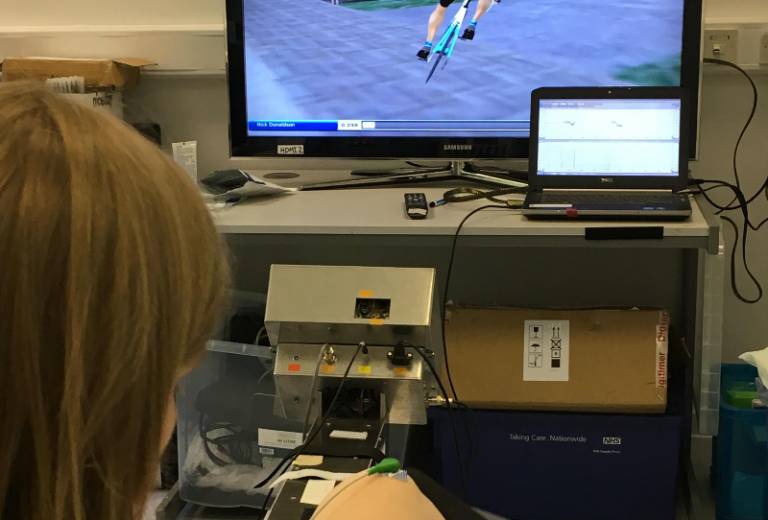Research Outline
Research interests of the Implanted Devices Group include functional electrical stimulation of paralysed muscle, stimulation treatment for rehabilitation by neuroplasticity, nerve interfaces, design of electronic implants, and the technology of implanted devices.
Projects
- CANDO (with Newcastle University and Imperial College London, funded by the Wellcome Trust). Our principal role is to test the components and materials that will be implanted in the brain to see whether they are reliable.
- iCYCLE (with Southampton University and the Royal National Orthopaedic Hospital, funded by the Inspire Foundation). Clinical testing of a novel exercise ergometer with spinal cord injured patients with incomplete lesions. The patients participate in virtual cycling races to maximise their voluntary effort which may improve the neuroplastic adaptation.
- Velocity-selective Recording. Project with the Royal Veterinary College and Bath University to test a method for extracting neural signals from the urinary bladder with a nerve interface at the sacral nerve roots. This method would be useful in neurological prostheses for restoring bladder control after spinal cord injury.
- ROBOVOX (lead by Prof Martin Birchall of UCL's Ear Institute, with Bristol University, funded by the Wellcome Trust). Our role is to produce an implant to record muscle responses and nerve traffic to control an artificial larynx (for laringectomy patients).
- CAPITel (funded by the Restoring Appearances Foundation Trust). Our role is to develop an implantable system to provide seamless control of limb prostheses for amputees.
Meet our academic researchers
Prof Nick Donaldson
Prof Donaldson, who directs the research group, has a range of areas in his research portfolio. These include: Electronic Design of Implanted Stimulators, Nerve Recording Devices and Systems; Instrumented orthopaedic implants; Velocity-selective Recording – obtaining more information from natural nerve traffic; Control of the body after spinal cord injury by natural and artificial means; Material science of implant materials (packaging & encapsulation); Use of Functional Electrical Stimulation for fitness after spinal cord injury; Artificial control of the urinary bladder after spinal cord injury; Design of connectors and wiring for implanted devices; and Nerve interfaces for control of prosthetic limbs. Read more here.
Dr Lynsey Duffell
Dr Duffell is a Lecturer in the Department, whose work with the Aspire Centre for Rehabilitation Engineering and Assistive Technologies (CREATe) focuses on translational research to improve the quality of life of people with spinal cord injuries.
Dr Henry Lancashire
Dr Lancashire works on the development and testing of active implantable medical devices. This encompasses device safety and longevity, electronic design, interaction with the body, and new materials and manufacturing approaches. Current and past research topics include: Microchannel interfaces with peripheral nerves; Electrochemistry and safety of neural stimulation; Hermetic and non-hermetic packaging for implantable electronics; Skin-crossing implants for biosignal transmission; and motion prediction using biosignals.
Dr Anne Vanhoestenberghe
An engineer by training, Dr Vanhoestenberghe specialises in the development of active medical implants, from design to manufacture, and their translation to the clinic, providing new therapeutic opportunities. Her work focuses on new methods for the protection of electronics in extreme environments, and the creation of the next generation of active implantable medical devices (AIMD); understanding, and solving, reliability issues for long-term human implantation of AIMD; and fast-prototyping and flexible manufacturing processes within a Quality Management System meeting regulatory approval for first-in-patient studies.


 Close
Close

